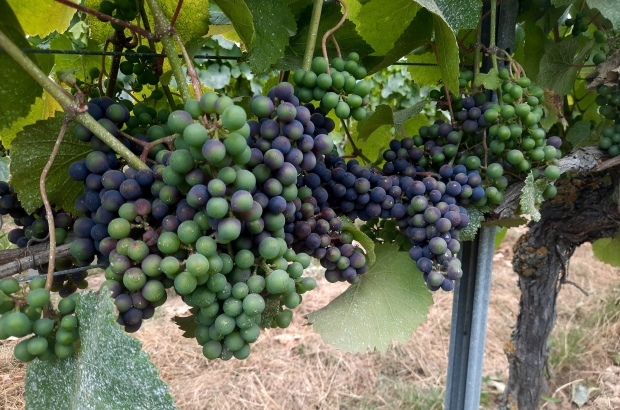- Daily & Weekly newsletters
- Buy & download The Bulletin
- Comment on our articles
Belgian winegrowers expect a good year despite drought conditions
While Belgium has been experiencing an exceptionally dry summer, winegrowers in Wallonia have welcomed the sunshine and expect 2022 to be a great year for Belgian wine.
“The vines are resistant plants,” Christian Balduyck of the Glabais vineyard in Walloon Brabant told Belga News Agency.
“Unlike the young plants, which are very sensitive to water shortages, the drought has not affected the older vines, whose roots are able to draw water deep from the soil.”
Balduyck predicts a good yield and – assuming no major weather disasters potentially damage vines – plans to harvest early. This is the usual pattern when the season is exceptionally hot and dry.
Jean-Bernard Despatures of Domaine du Chenoy in Namur also expects “good quantities from the oldest vines and a larger production than in previous years”.
The hot, dry weather aided production in two major ways: it prevented disease and helped grapes reach high levels of ripeness, which leads to better quality wines compared to wetter, colder years.
Climate change concerns remain
But better quality isn’t necessarily accompanied by larger quantities, reported VRT earlier this year. Growers expressed concern about the effects of climate change on yields and the increasing prevalence of extreme weather events.
Last year, which saw heavy rains and flooding, caused Belgian wine production to fall by almost a third (27%). Production sank to 1.35 million litres between 2020 and 2021, according to figures from the Federal Public Service Economy.
Growers also had to grapple with insects, wild boars and starlings eating away at the harvest, in addition to the floods.
The south of Belgium was especially affected, with production falling by 35% (640,332 litres compared with 1,003,059 litres in 2020) in Wallonia. The decline was more moderate in Flanders (-15%, to 718,738 litres), which became the most productive region in the wine industry.
Despite the challenges, 2021 saw an increase in the number of people entering the winegrowing profession: there were 237 professional and amateur winegrowers in 2021, compared to 198 a year earlier and 154 in 2019.
The province of Liège saw the greatest number of new growers, with 32 joining the sector in 2021 compared to in 2020. With 63% of the total share, Flanders still has twice as many winegrowers as Wallonia, but the south is catching up.
Approximately 695 hectares were used for wine production across Belgium last year.
Photo: © Domaine Viticole de Chenoy



















